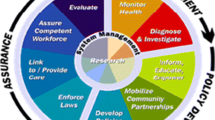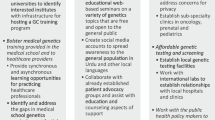Abstract
In an era of specialty medicine, genetic counselors are becoming increasingly focused in their service provision. The Alpha-1 Association Genetic Counseling Program, established in September 2007, specializes in confidential toll-free genetic counseling provided by a certified genetic counselor for Alpha-1 Antitrypsin deficiency, a co-dominant condition associated with lung and/or liver disease. The program received more than 600 callers in its first 2 years. Sixty-seven percent of new callers were family members, carriers, or health professionals. The number of callers increased between the first 2 years, with the greatest increases being family members and health professionals. Testing options and explanation of results encompassed 60% of initial reasons for calls. Seventy-two percent of referrals came from family and friends, test result letters, and the Alpha-1 Association. Between year 1 and 2 family member referrals showed the largest increase. This disease-specific genetic counseling program provides a model that may be useful for other rare disease communities.





Similar content being viewed by others
References
American Thoracic Society/European Respiratory Society (2003). American Thoracic Society/European Respiratory Society statement: standards for the diagnosis and management of individuals with alpha-1 antitrypsin deficiency. American Journal of Respiratory and Critical Care Medicine, 168(7), 818–900.
Baumanis, L., Evans, J. P., Callanan, N., & Susswein, L. R. (2009). Telephoned BRCA1/2 genetic test results: prevalence, practice, and patient satisfaction. Journal of Genetic Counseling, 18(5), 447–463.
de Serres, F. J., Blanco, I., & Fernandez-Bustillo, E. (2003). Genetic epidemiology of alpha-1 antitrypsin deficiency in North America and Australia/New Zealand: Australia, Canada, New Zealand and the United States of America. Clinical Genetics, 64(5), 382–397.
Jenkins, J., Calzone, K. A., Dimond, E., Liewehr, D. J., Steinberg, S. M., Jourkiv, O., et al. (2007). Randomized comparison of phone versus in-person BRCA1/2 predisposition genetic test result disclosure counseling. Genetics in Medicine, 9(8), 487–495.
National Society of Genetic Counselors, Inc. (2010). Professional Status Survey 2010.
National Society of Genetic Counselors: Genetic Counseling as a Profession. (2005). Retrieved January 14, 2010, from http://www.nsgc.org/about/definition.cfm
Ormond, K., Haun, J., Cook, L., Duquette, D., Ludowese, C., & Matthews, A. (2000). Recommendations for telephone counseling. Journal of Genetic Counseling, 9(1), 63–71.
Peshkin, B. N., Demarco, T. A., Graves, K. D., Brown, K., Nusbaum, R. H., Moglia, D., et al. (2008). Telephone Genetic Counseling for High-Risk Women Undergoing BRCA1 and BRCA2 Testing: Rationale and Development of a Randomized Controlled Trial. Genet Test.
Sangha, K., Dircks, A., & Langlois, S. (2003). Assessment of the effectiveness of genetic counseling by telephone compared to a clinic visit. Journal of Genetic Counseling, 12(2), 171–184.
Serpin Peptidase Inhibitor, Clade A, Member 1; SERPINA1 (Publication., from Johns Hopkins University.
Stoller, J. K., Smith, P., Yang, P., & Spray, J. (1994). Physical and social impact of alpha 1-antitrypsin deficiency: results of a survey. Cleveland Clinic Journal of Medicine, 61(6), 461–467.
Stoller, J. K., Brantly, M., Fleming, L. E., Bean, J. A., & Walsh, J. (2000). Formation and current results of a patient-organized registry for alpha(1)-antitrypsin deficiency. Chest, 118(3), 843–848.
Stoller, J. K., Sandhaus, R. A., Turino, G., Dickson, R., Rodgers, K., & Strange, C. (2005). Delay in diagnosis of alpha1-antitrypsin deficiency: a continuing problem. Chest, 128(4), 1989–1994.
Strange, C., Dickson, R., Carter, C., Carpenter, M. J., Holladay, B., Lundquist, R., et al. (2004). Genetic testing for alpha1-antitrypsin deficiency. Genetics in Medicine, 6(4), 204–210.
Strange, C., Stoller, J. K., Sandhaus, R. A., Dickson, R., & Turino, G. (2006). Results of a survey of patients with alpha-1 antitrypsin deficiency. Respiration, 73(2), 185–190.
Uhlmann, W. R., Schuette, J. L., & Yashar, B. M. (Eds.). (2009). A guide to genetic counseling (2nd ed.). Hoboken: Wiley.
Wang, V. (2000). Commentary: what is and is not telephone counseling? Journal of Genetic Counseling, 9(1), 73–82.
Disclosure of interest
Dawn McGee and Dr. Charlie Strange receive salary support through a research grant funded by the Alpha-1 Association, a non-profit patient support organization. Marlene Erven is an employee of the Alpha-1 Association. All authors have full control of all primary data and agree to allow the journal to review data if requested.
Author information
Authors and Affiliations
Corresponding author
Rights and permissions
About this article
Cite this article
McGee, D., Strange, C., McClure, R. et al. The Alpha-1 Association Genetic Counseling Program: An Innovative Approach to Service. J Genet Counsel 20, 330–336 (2011). https://doi.org/10.1007/s10897-011-9355-z
Received:
Accepted:
Published:
Issue Date:
DOI: https://doi.org/10.1007/s10897-011-9355-z




